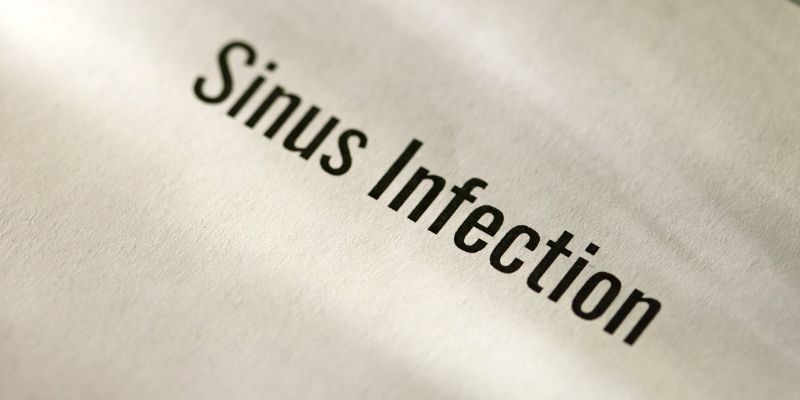You have sinusitis when the membranes that line your sinuses become inflamed and swollen. Infections are a common cause of this symptom. Sinusitis symptoms can include facial pain and a stuffy nose.
In most cases, sinusitis clears up within a few weeks. But if it doesn't work, some treatments might. Sinuses are air-filled chambers in the bones of your face and skull.
Sinusitis can be one of two types. Sinus infections, whether acute or chronic, can develop in response to viral or bacterial infections, allergic reactions, or environmental irritants. When a sinus infection lasts over 12 weeks, we call it chronic.

What Is Sinusitis?
When the sinuses become inflamed, the condition is known as sinusitis. Acute sinusitis, often known as a sinus infection, is caused by an infection in the sinuses. In contrast, chronic sinusitis is caused by poor drainage of the sinuses, allergies, or other underlying medical issues that irritate the sinuses over time.
The small drainage channels of the sinuses are a major key factor in the emergence of sinus infections because they are easily obstructed by swelling of tissue in the drainage system. Potential causes of acute sinusitis include viruses, bacteria, and fungi.
Sinus infection symptoms are similar to the common cold and include stuffy nose, cough, nasal drainage, headache, postnasal drip, and facial pain. We usually don't diagnose a sinus infection until the symptoms have persisted for at least ten days. Although harmless bacteria bring on most sinus infections, those with preexisting conditions are more likely to experience complications.

What Are The Causes Of Sinus?
Sinuses are bony cavities in the skull that are filled with air. These can be found concealing the bones of the forehead, nose, cheeks, and eyes. No bacteria or other germs can be found in healthy sinuses.
The sinuses usually function normally, with mucus draining out and air flowing freely. Too much mucus or congestion in the sinuses can foster the growth of bacteria and other pathogens.
Any of these disorders have the potential to cause sinusitis.
- A persistent infection might cause inflammation and edema of the mucosa.
- Nasal polyps, a nasal bone spur, or a deviated nasal septum can cause sinus obstruction.
- The sinuses' tiny hairs are ineffective in draining mucus. Certain medical issues may be to blame for this.
- Allergies and colds can exacerbate mucus production and nasal passage obstruction.
Signs And Symptoms Of Sinus Infection
Low Energy And Fatigue
Your body's energy will be diverted toward fighting off the sinus infection, so you can expect to feel more tired than usual. Headaches, sleep deprivation, and sinusitis-related respiratory distress are all potential causes of fatigue.
Lack Of Odor And Taste Sense
Sinus congestion makes it difficult to breathe via the nose, which in turn reduces your olfactory abilities. Your sense of smell influences your taste. A sinus infection might dull your sense of taste, but you should still be able to identify sweet from salty.
Postnasal Drip
You have a postnasal drip when your nasal discharge flows down the back of your throat instead of out your nose. Postnasal drip causes a ticklish or itchy sensation, prompting frequent throat clearing and coughing. The irritation and inflammation in your throat might also cause you to experience a painful throat and a scratchy or hoarse voice.
Forehead Pain
Sinus infections often manifest with pain. When you have sinusitis, you may feel discomfort, pressure, or a throbbing sensation anywhere from your forehead to your neck to your teeth and upper jaw.
Experiencing Persistent Symptoms for More Than Two Weeks
A cold lasting longer than two weeks is probably not at all. On the other hand, you could have a sinus infection. A cold lasts 7-14 days, whereas acute sinusitis can last up to a month. Chronic sinusitis typically lasts between four and twelve weeks but can persist for years.
How Can Sinusitis Be Treated?
Doctors do not prescribe antibiotics when symptoms persist for fewer than 10 days. It can help to use a nasal saline spray or rinse, which can be purchased over the counter. It can prevent a cold from developing into a sinus infection by flushing out the nose and removing any excess mucus or irritants.
When diagnosed, your doctor or ENT may recommend antibiotics to treat your sinus infection. Other treatments, such as oral or nasal steroid sprays or nasal decongestants, may be prescribed by your doctor; nevertheless, it is crucial to strictly adhere to the instructions for using these drugs to avoid any unintended side effects.
Chronic sinusitis patients can still benefit greatly from and should use nasal saline sprays or rinses. Steroid sprays for the nose may be suggested to decrease inflammation and enhance sinus outflow.
If allergies are considered a factor in sinus inflammation, antihistamines or other drugs may be prescribed. In cases where a shorter course of antibiotics has proven ineffective, your doctor may recommend a longer course of medication.
Sinusitis Prevention Tips
There are some easy steps you may take to reduce your chances of developing sinusitis.
- Don't smoke, and stay away from smoky or polluted environments.
- It will help if you avoid exposure to whatever causes your allergies.
- Be sure to thoroughly wash your hands after coming into close contact with someone ill.
- Having allergy tests can be helpful if you suffer from chronic sinusitis due to allergies.
You can ask your care physician or ear, nose, and throat (ENT) specialist for a referral to an allergy clinic.
Conclusion:
Pain and pressure in your head and face, a runny nose, and a hacking cough are the symptoms you're experiencing. Sinusitis is more likely than a cold if the symptoms persist for over 10 days. Sinusitis can resolve on its own, untreated if brought on by something like a virus, a cold, or allergies.
Chronic sinusitis, lasting up to eight weeks, is diagnosed when symptoms remain longer than 10 to 14 days. Your Mercy physician can diagnose sinusitis from your medical history and a physical examination. Further testing is probably unnecessary. If the cause of your sinusitis is viral, you may not need medication at all.




